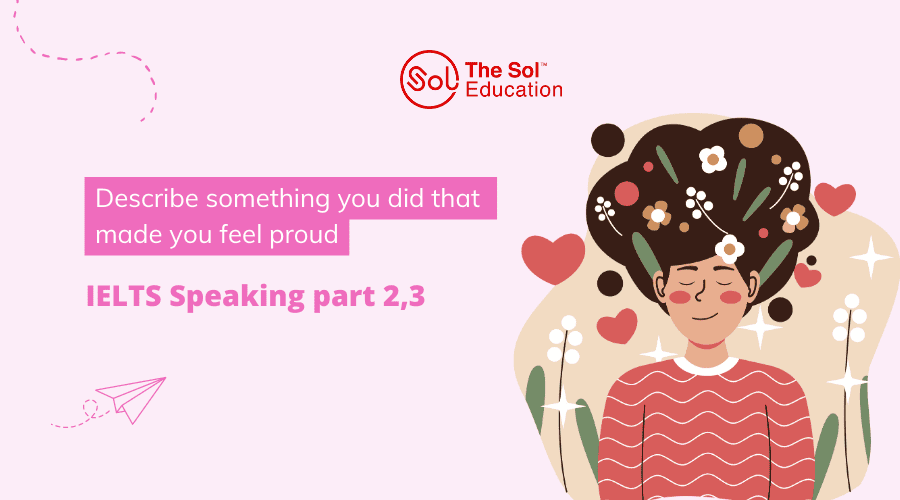“Describe something you did that made you feel proud” thuộc nhóm chủ đề “Describe an experience (miêu tả trải nghiệm)” là chủ đề quan trọng trong IELTS Speaking Part 2. Trong bài viết này, SOL sẽ gợi ý cho bạn một bài nói mẫu, đồng thời, giới thiệu về các từ vựng và mẫu câu giúp để bạn có thể đạt được band điểm cao nhé.

Describe something you did that made you feel proud
You should say:
One thing that made me feel immensely proud was when I successfully organized a charity event at my school to raise funds for underprivileged children in my community. It was a project that I had been passionate about, and I was determined to make a positive impact on the lives of those in need.
To organize the charity event, I first gathered a group of enthusiastic classmates who shared the same vision. Together, we brainstormed ideas for the event, such as a talent show, food fair, and various fun games. I took on the role of the project leader, assigning tasks to each team member based on their strengths and interests.
However, we faced a significant challenge in securing a suitable venue for the event. To overcome this difficulty, I decided to approach local businesses and organizations for sponsorship. I drafted persuasive proposals highlighting the positive impact of their support on the community and the chance to be part of a meaningful cause. Thanks to our perseverance and convincing arguments, we managed to secure a generous sponsor who provided us with a venue free of charge.
During the event, we faced some unexpected setbacks, like technical issues with the sound system and last-minute changes in the schedule. But, we remained calm and worked together as a team to improvise and find solutions. Our positive attitude and flexibility in handling challenges impressed everyone involved, and the event turned out to be a great success.
I felt incredibly proud of this accomplishment because we were able to raise a substantial amount of money that significantly benefited the underprivileged children in our community. It was a remarkable achievement that I will always cherish, and it motivates me to continue engaging in initiatives that contribute to the welfare of others.
In my view, both personal goals and work goals are important, but their significance may vary depending on an individual's priorities and life circumstances. Personal goals encompass various aspects of life, such as health, relationships, self-improvement, and overall well-being. They contribute to one's happiness and fulfillment. On the other hand, work goals are essential for professional growth, career advancement, and achieving success in one's chosen field. Striking a balance between personal and work goals is crucial to lead a fulfilling and meaningful life.
Yes, my life goals have evolved since my childhood. In childhood, goals are often simple and influenced by immediate desires and aspirations. As I matured and gained more life experiences, my perspective and priorities changed. I began to set more long-term and meaningful goals related to education, career, and personal development. Life's journey has shaped my ambitions, and I continue to reassess and refine my goals as I progress through different stages of life.
While many people do set goals for themselves, it may not be the case for everyone. Setting goals requires self-awareness, motivation, and the ability to plan for the future. Some individuals may not actively engage in goal-setting due to various reasons, such as a lack of direction, contentment with their current situation, or uncertainty about the future. However, setting goals can provide direction and purpose in life, leading to personal growth and achievements.
At work, different types of rewards are essential to motivate employees and boost their satisfaction and productivity. Apart from financial rewards like salary increases and bonuses, non-monetary rewards such as recognition and praise for a job well done can be equally important. Opportunities for career advancement, skill development, and a positive work environment are also significant rewards that contribute to job satisfaction and employee retention.
While material rewards are undoubtedly important and serve as tangible incentives, they may not be the sole driving factor for job satisfaction and motivation. Non-material rewards, such as job autonomy, a supportive work culture, and opportunities for personal growth, are equally vital. A well-balanced approach that considers both material and non-material rewards can lead to a more motivated and engaged workforce.
People feel proud of themselves when they achieve personal milestones, overcome challenges, and make positive contributions to their lives and the lives of others. Accomplishing their goals, fulfilling their responsibilities, and displaying integrity in their actions can evoke a sense of pride. Additionally, receiving recognition and appreciation for their efforts and accomplishments from others can also contribute to feelings of pride and self-worth.
Để làm tốt phần thi IELTS Speaking, đầu tiên hãy tìm hiểu thật kỹ Tiêu chí chấm điểm của một bài thi IELTS Speaking nhé. Bên cạnh đó, đừng học thuộc lòng 100% các câu trả lời mẫu, vì đây chỉ là các hướng dẫn dành cho bạn. Bạn có thể lấy ý tưởng của câu trả lời, từ đó biến nó thành ngôn ngữ và cách diễn đạt của riêng mình. Hãy luyện tập bằng cách ghi âm lại phần nói của mình và nghe lại, đây là một cách rất hữu ích để luyện speaking và tìm ra điểm chưa tốt của mình luôn.
Ngoài ra, bạn có thể tham khảo thêm một số bài viết dưới đây của SOL để có thể nói tốt hơn:
